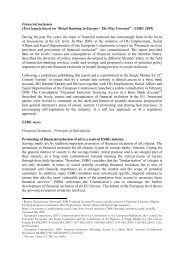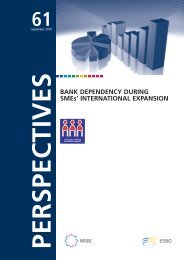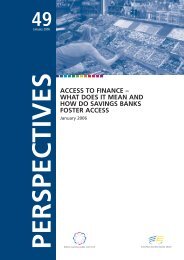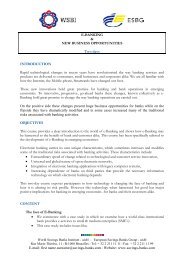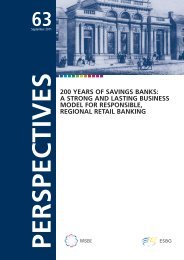A comparative analysis of the US and EU retail banking markets - Wsbi
A comparative analysis of the US and EU retail banking markets - Wsbi
A comparative analysis of the US and EU retail banking markets - Wsbi
You also want an ePaper? Increase the reach of your titles
YUMPU automatically turns print PDFs into web optimized ePapers that Google loves.
The market share <strong>of</strong> <strong>the</strong> <strong>US</strong> <strong>banking</strong> market <strong>of</strong><br />
commercial banks in terms <strong>of</strong> total assets at <strong>the</strong> end<br />
<strong>of</strong> 2003 was 78% 8 .<br />
3.2.1.1.2.2 Ownership structure <strong>and</strong> activities<br />
The ownership structure <strong>of</strong> choice for <strong>US</strong> commercial<br />
banks, which is that <strong>of</strong> <strong>the</strong> bank holding company,<br />
is directly linked to <strong>the</strong> activities that banks were<br />
permitted to perform. For this reason, we speak <strong>of</strong><br />
ownership structure <strong>and</strong> activities in <strong>the</strong> same section.<br />
In practice, commercial banks can be independently<br />
owned by private investors (stockholders) or by bank<br />
holding companies. The vast majority <strong>of</strong> commercial<br />
banks in <strong>the</strong> <strong>US</strong> today are owned by bank holding<br />
companies. These are corporations or o<strong>the</strong>r entities<br />
that own a majority <strong>of</strong> stocks or securities <strong>of</strong> one<br />
(one-bank holding company) or more (multi-bank<br />
holding company) banks, thus obtaining control <strong>of</strong><br />
<strong>the</strong> o<strong>the</strong>r corporation(s). Bank holding companies<br />
own nearly all – 97% – <strong>of</strong> <strong>the</strong> insured commercial<br />
banks by assets 9 .<br />
The bank holding company form <strong>of</strong> ownership<br />
became increasingly attractive to commercial banks<br />
in response to restrictions on <strong>the</strong> scale <strong>and</strong> scope <strong>of</strong><br />
<strong>banking</strong>. On <strong>the</strong> liability side, commercial banks<br />
were limited in terms <strong>of</strong> <strong>the</strong> types <strong>of</strong> liabilities <strong>the</strong>y<br />
could issue <strong>and</strong> <strong>the</strong> rates <strong>the</strong>y could pay depositors.<br />
They were generally relegated to <strong>the</strong> business <strong>of</strong><br />
making (primarily) business loans <strong>and</strong> providing<br />
transaction accounts (or close substitutes) in fairly<br />
localised areas.<br />
This stemmed from <strong>the</strong> Acts put in place in <strong>the</strong> <strong>US</strong> to<br />
keep <strong>the</strong> businesses <strong>of</strong> commercial <strong>banking</strong> <strong>and</strong><br />
investment <strong>banking</strong> strictly separate: <strong>the</strong> Glass-<br />
Steagall Act <strong>of</strong> 1933, which prohibited banks from<br />
engaging directly or indirectly in <strong>the</strong> underwriting <strong>of</strong><br />
or dealing in securities, <strong>and</strong> <strong>the</strong> Bank Holding<br />
Company Act <strong>of</strong> 1956, which prohibited banks from<br />
affiliating with insurance underwriters <strong>and</strong> nonfinancial<br />
firms. Thus, for investment <strong>banking</strong> <strong>and</strong><br />
insurance services, individuals <strong>and</strong> corporations had<br />
to go to o<strong>the</strong>r financial-service providers.<br />
After <strong>the</strong>se prohibitions gradually eroded because<br />
<strong>of</strong> decisions by regulators <strong>and</strong> courts as well as<br />
market place practises, Congress passed <strong>the</strong> Gramm-<br />
Leach-Bliley Act (GLB) that fur<strong>the</strong>r blurred those<br />
distinctions by facilitating financial sector combinations<br />
<strong>and</strong> regulatory change in November 1999. The GLB<br />
repealed Sections 20 <strong>and</strong> 32 <strong>of</strong> <strong>the</strong> Glass-Steagall<br />
Act which prohibited affiliations between banks <strong>and</strong><br />
securities firms <strong>and</strong> amended <strong>the</strong> Bank Holding Act.<br />
Under <strong>the</strong> GLB banks <strong>and</strong> securities firms continue to<br />
be prohibited from directly engaging in each o<strong>the</strong>r’s<br />
business. However, <strong>the</strong> GLB created a new form<br />
<strong>of</strong> bank holding company, <strong>the</strong> financial holding<br />
company, which is allowed to engage in an<br />
exp<strong>and</strong>ed range <strong>of</strong> activities.<br />
The exp<strong>and</strong>ed permissible activities for <strong>the</strong>se holding<br />
companies include securities underwriting <strong>and</strong> dealing,<br />
insurance agency activities <strong>and</strong> insurance underwriting,<br />
acting as a futures commission merchant, <strong>and</strong> merchant<br />
<strong>banking</strong> (‘financially related activities’). The Federal<br />
Reserve Board <strong>and</strong> <strong>the</strong> Secretary <strong>of</strong> <strong>the</strong> Treasury have<br />
<strong>the</strong> authority to determine whe<strong>the</strong>r o<strong>the</strong>r activities<br />
are financial in nature or incidental to financial<br />
activities <strong>and</strong> hence permissible for <strong>the</strong>se holding<br />
companies to engage in.<br />
Fur<strong>the</strong>rmore, a financial holding company may engage<br />
in any non-financial activity if <strong>the</strong> Federal Reserve<br />
Board determines that <strong>the</strong>y are complementary to a<br />
financial activity <strong>and</strong> do not pose a substantial risk to<br />
<strong>the</strong> safety or soundness <strong>of</strong> depository institutions or<br />
<strong>the</strong> financial system (‘complementary activities’).<br />
Thus, financial holding companies are simply a subset<br />
<strong>of</strong> bank holding companies that are authorised to<br />
engage in an exp<strong>and</strong>ed range <strong>of</strong> activities.<br />
Commercial banks can <strong>the</strong>refore become affiliates <strong>of</strong> a<br />
larger <strong>banking</strong> organisation, including also non-bank<br />
financial firms as affiliates 10 , <strong>the</strong>reby allowing <strong>the</strong><br />
holding company to exp<strong>and</strong> <strong>the</strong> scope <strong>of</strong> its activities<br />
into areas not permitted to independently owned banks.<br />
Using <strong>the</strong> holding company form <strong>of</strong> organisation<br />
<strong>the</strong>refore allows bankers to diversify <strong>the</strong>ir product<br />
lines <strong>and</strong> <strong>of</strong>fer services requested by <strong>the</strong>ir customers<br />
<strong>and</strong> provided by <strong>the</strong>ir European counterparts.<br />
8 ESBG calculation based on figures from <strong>the</strong> Federal Deposit Insurance Corporation (FDIC) <strong>and</strong> <strong>the</strong> Credit Union National Association (CUNA).<br />
9 From remarks by Governor Mark W. Olson at <strong>the</strong> Fortieth Annual Conference on Bank Structure <strong>and</strong> Competition, Sponsored by <strong>the</strong> Federal Reserve Bank <strong>of</strong><br />
Chicago, May 6, 2004.<br />
10 Section 4 (c) <strong>of</strong> <strong>the</strong> Bank Holding Company Act provides a "laundry list" <strong>of</strong> permissible interests <strong>of</strong> bank holding companies in non-bank activities. Bank holding<br />
companies may hold shares <strong>of</strong> o<strong>the</strong>r companies as a fiduciary, <strong>and</strong> may own less than 5% <strong>of</strong> <strong>the</strong> shares <strong>of</strong> any o<strong>the</strong>r company. They may also own <strong>the</strong> shares<br />
<strong>of</strong> foreign companies that do most <strong>of</strong> <strong>the</strong>ir business abroad, <strong>and</strong> <strong>the</strong> shares <strong>of</strong> export trading companies. Fur<strong>the</strong>rmore, section 4(c)(8) <strong>of</strong> <strong>the</strong> Bank Holding<br />
Company Act empowers <strong>the</strong> Board <strong>of</strong> Governors <strong>of</strong> <strong>the</strong> Federal Reserve System to approve o<strong>the</strong>r non-bank activities that are "closely related to <strong>banking</strong>",<br />
such as for instance <strong>the</strong> provision <strong>of</strong>: consumer finance, credit cards, mortgage finance, financial counselling, securities brokerage, government securities<br />
underwriting, printing <strong>and</strong> selling checks.<br />
23



